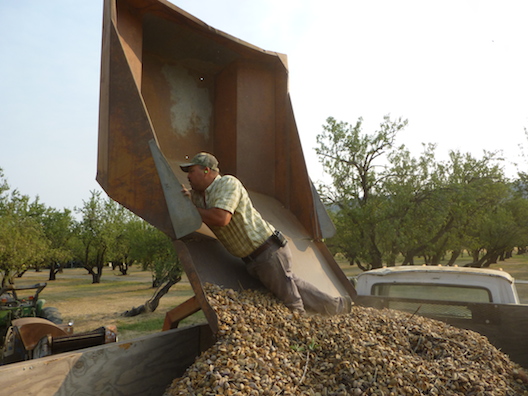What is happening at this time of year in Full Belly Farm’s fields? Our CSA boxes give a hint of changes, containing cool weather greens alongside the last of summer’s harvest. Does the change in season bring a change in rhythm to the farm? We still have a big crew working every day, and one person who can answer these questions and who is very important in organizing the day’s work, is Juan Jacobo Berrelleza, known to us all as Pancho.
Pancho lives a few miles up the road from the farm with his wife Nina, and two kids Joel (16) and Julia (12). He has worked at Full Belly since 1992 when he was 18, with only a short break for several years when he farmed with relatives.
I asked Pancho to talk with me about his work so that I could share some of his story with our CSA members. He was a bit reluctant to take time away from a long list of things that he was hoping to get done. This interview wasn’t on the morning’s list. After talking with him, I understood that he carries in his head, knowledge of all of Full Belly’s equipment, the crews, the fields and their condition, and a timeline of what needs to be finished in the window allowed by our climate and cropping plans.
One job that is always a lot of work at this time of year, is to clean up the summer fields that grew tomatoes, eggplants and peppers. Just removing the plants alone can be a huge job. Tractors and tractor drivers are always in short supply, chopping up the plants and clearing them out of the fields. Many of these fields have drip irrigation line in them that has to be picked up and stored in rolls for next year. Also, we are using a lot of plastic mulch for weed control and water retention (as explained in a previous newsletter) and that needs to be cleared up and recycled. Pancho said that he was preoccupied for the last few days, figuring out how he was going to clean up a huge mountain of tangled plants and plastic that had resulted from a mistake with a tractor implement that was dragging debris around. He shook his head and said that even if he was TRYING to make a big mess he didn’t think that he could have made as much mess as this one. Making matters worse, every time someone described what it looked like, I heard them say, “and it’s right next to the highway…” Farmers are always aware of how their fields look from the highway!
I asked him if the season’s change brings a change in his work. He answered that we are almost done with planting greens and we are getting fields ready for next spring. Preparing fields for potatoes or tomatoes means disking and planting a cover crop. Thinking about next year, we have to plan which fields are best for the all-important first crop of tomatoes. We have chosen a warm rented field, up the road from the farm’s home base. We don’t know when we will plant the first tomatoes, but we can be totally prepared in case the weather gives us the mid March window that we hope for. The beds have to be ready and fertilized, with underground drip tape installed. We often pre-irrigate to bring up weeds, but the beds have to have just the right moisture for planting. Pancho said that Andrew will be planning for 50 beds to be ready at a certain time, and Amon will be looking for beds to plant as well. At this point, “Mostly it’s about next year, figuring out how to have it all ready. It’s like a big game. You have to be here and there all the time. It’s a lot of thinking.”
I asked Pancho how he learned how to do all of this. “That’s a good question. Just watching and working for many years, I figured it out for myself. I learned from watching. It’s easy now because I know what to do – but this farm is kind of complicated. You have to think about the things that are going to happen in 2 weeks, next month and next year.”
I asked Pancho about our machinery and he listed our tractors, from the smallest to the biggest. The biggest tractors make him happy because they are so strong. In the past, before we got the bigger tractors, and when we didn’t really have enough tractors, there wasn’t much flexibility. We would be connecting and disconnecting implements 5 or 6 times a day. And if we wanted to use a heavy implement… well we broke a few tractors because we put something too heavy on them. Now, with our big tractor, you can use the heavy implements.
Pancho likes it most when the work goes smoothly and everything is organized. He likes it when everything is moving forward and people understand what they need to do. “That’s my favorite part – when everyone understands and there are no problems. It happens that way sometimes.”
–Judith Redmond
 Pancho working on the almond harvest. (Photo courtesy Joel Berrelleza)
Pancho working on the almond harvest. (Photo courtesy Joel Berrelleza)
